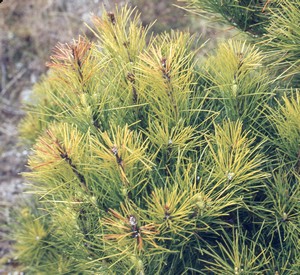Striking the boron balance

Boron is vital to tree growth, but the quantity of boron is equally important. Too little will cause deformities in conifers, and too much of it can be toxic.
Recent studies by Scion indicate that Douglas-fir may be particularly sensitive to boron toxicity. An optimum range of 4–8 kg per hectare of boron produced the greatest plant growth rate for radiata pine seedlings in a greenhouse study where climatic conditions were controlled. In contrast, an application rate of 4 kg per hectare was found to reduce growth of young Douglas-fir at a high country site, indicating a lower rate of 1-2 kg per hectare is more appropriate for this species.
These results demonstrate that the range between boron deficiency and toxicity in two important commercial tree species is narrow and species-specific – important information for tree growers.
Results have been published in the New Zealand Journal of Forestry Science (D-fir) and Communications in Soil Science and Plant Analysis (radiata pine).
Contact: Show email
